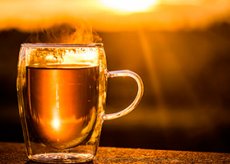New publications
Drinking hot beverages is dangerous
Last reviewed: 02.07.2025

All iLive content is medically reviewed or fact checked to ensure as much factual accuracy as possible.
We have strict sourcing guidelines and only link to reputable media sites, academic research institutions and, whenever possible, medically peer reviewed studies. Note that the numbers in parentheses ([1], [2], etc.) are clickable links to these studies.
If you feel that any of our content is inaccurate, out-of-date, or otherwise questionable, please select it and press Ctrl + Enter.

What drink do we most often drink in cool weather? That's right: hot tea. It not only warms you up, but also gives you a surge of energy, eliminates the first signs of a cold, and invigorates you. However, scientists warn: a hot drink can be very dangerous to your health. If you regularly drink hot tea, the risk of getting esophageal cancer increases many times over.
Previously, researchers pointed mainly to the healing properties of tea: tea leaf infusion contains polyphenols, antioxidants and other useful components. The drink is extremely popular in all corners of the planet. According to statistical services, in 2016 alone, about three million tons of tea leaves were sold worldwide.
What have scientists discovered now? They still support moderate consumption of the drink, but only under the following condition: it should not be hot.
According to the results of the research work carried out by employees of the University of Beijing, an increased danger of drinking hot tea was established - especially if such tea is consumed by a person who abuses smoking or alcohol.
According to data provided by the World Cancer Research Fund, malignant disease of the esophagus ranks eighth among the global incidence of cancer processes. The highest percentage of morbidity is recorded annually among residents of China and the Central Asian region.
One of the authors of the work, Jun Liu, a representative of the biostatistical and epidemiological departments at the University of Beijing, points to the presence of a serious connection between the consumption of hot drinks and the development of cancer in the esophagus.
Professor Liu has been studying the effect of high temperatures on the occurrence of cancer in the esophagus for a long time. He was able to confirm that a number of irritants play a certain role in the malignant transformation of cellular structures of the digestive tract. First of all, we are talking about alcohol, nicotine and high-temperature liquids. It turned out that a person who does not drink or smoke can periodically allow himself to drink freshly brewed hot tea - the likelihood of negative consequences is minimal. However, a person who smokes and drinks alcohol, who at the same time likes to indulge himself with a hot drink, increases the risk of developing esophageal cancer many times over.
Experts monitored the health of volunteers as part of the China Kadoorie Biobank project. This project was aimed at combining and evaluating information on various chronic pathologies in Chinese residents. To ensure the accuracy of the data obtained, experts did not preliminarily include patients with diagnosed cancer in the list, regardless of their localization.
Almost 500,000 patients of different sexes and ages took part in the final testing. Over the next 10 years, more than 1,700 participants were diagnosed with a cancerous process in the esophagus.
As scientists calculated, the combination of smoking, drinking alcohol and hot tea increased the risk of developing esophageal cancer by 5 times. This tendency was not found in people who drank tea and led a healthy lifestyle.
Details of the study are described in the Annals of Internal Medicine and on the journal's website annals.org

 [
[